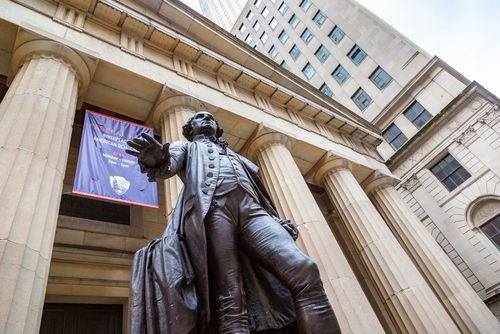[Reuters Analysis] Why China won't 'weaponize' its U.S. Treasuries stash: McGeever

By Jamie McGeever
ORLANDO, Florida, April 30 (Reuters) - China's 'nuclear' option in its financial war with the United States has long been assumed to be rapidly liquidating its outsized Treasury bond holdings, as this could crash the dollar, jack up interest rates and disrupt the U.S. economy.
Concerns about this potential threat have returned in recent weeks, as all-out trade war has broken out between the world's two largest economies. But this fear of 'mutually assured financial destruction' is, and has always been, a notion based more in myth than reality.
Dollar-denominated assets made up 55% of China's official currency reserves at the end of 2019, the last official confirmation of this figure by China's State Administration of Foreign Exchange (SAFE), down significantly from the peak of 79% in 2005. It was also below the prevailing global average in 2019 of 61%, according to International Monetary Fund data.
Some of this has likely been offset by increased dollar holdings among state commercial banks, whose foreign portfolios are thought to be much more weighted toward dollar assets. But, like other countries, China has been steadily reducing its relative exposure to the greenback over the past 20 years.
This trend is even clearer with regard to China's official holdings of U.S. Treasuries, which stood at $784 billion in February, according to U.S. Treasury data. That's down from a peak of $1.32 trillion in 2013 and is less than 3% of the $28 trillion Treasuries market, a far cry from the high of 14% that China commanded in 2011.
China does own Treasuries held in other countries like Belgium, but again, the trend is clearly moving in the direction of less exposure to the U.S.
These figures suggest that China's power to inflict damage in the U.S. bond market has been diluted considerably over the last decade.
COULD THEY DO IT?
Nevertheless, the outflows it could potentially trigger by selling are still huge in nominal terms.
Could China sell large chunks of its Treasuries stash? Of course, anything is possible, especially now that the established global economic, financial and political norms of the past several decades are being rewritten.
But it certainly wouldn't be in China's interest to do so. The obvious reason is the most pertinent: dumping Treasuries would crush the value of its own holdings, landing a risk-averse state with heavy losses. Poking Washington in the eye is one thing, shooting oneself in the foot is another.
From a practical standpoint, it would also be extremely difficult. The market would almost certainly get wind that something was up and sell to get ahead of the game, again leaving Beijing with significant capital losses.
Moreover, any market dysfunction would also quickly be met with large-scale buying from the Federal Reserve to ensure financial stability.
And the last thing China needs in the face of weak growth, deflation and a crippling trade war with the U.S. is a stronger currency. Beijing would not necessarily have to buy yuan with the proceeds from any Treasury sales. But in its current situation, it would be counterproductive for Beijing to try to undermine the U.S. by weakening the dollar, even temporarily.
"100-YEAR HORIZON"
Instead, China could 'move up the curve' by allowing the Treasury notes it holds to mature, reinvesting the proceeds in bills or other cash instruments. That's a dollar-neutral policy, but it could still push long U.S. yields higher.
"We know the U.S. is having some trouble selling notes - China could make that even harder," says Brad Setser, senior fellow at the Council on Foreign Relations.
Beijing could also make stronger tweaks to its non-U.S. custody holdings of Treasuries, or Chinese state commercial banks could reduce their holdings, as neither would appear in official FX reserves data.
But ultimately, China is probably stuck with the Treasuries it has, and the route to lowering that exposure will be the same as it has been for years: passive and gradual.
At an event hosted by the Institute of International Finance in Washington last week, U.S. Treasury Secretary Scott Bessent said he wants to see quick "results" in fixing global trade, economic and financial imbalances.
"Some countries might have a 100-years perspective. We don't," he quipped, clearly nodding to China.
China's economic horizon may not be quite that long, but it is longer than Washington's. And as China considers what to do with its U.S. debt or dollar holdings, it will likely leave the rash policymaking to Washington and continue to play the long game.
(The opinions expressed here are those of the author, a columnist for Reuters.)
China's footprint in U.S. bond market
U.S. Treasuries holdings - China vs World
China's U.S. asset holdings - CFR's Brad Setser








